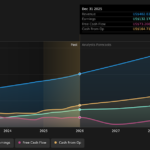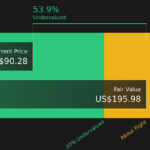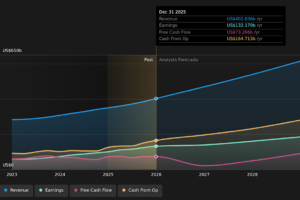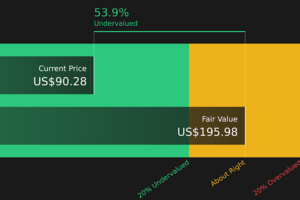We recently published a list 10 Best Enterprise Software Stocks to Buy Now. In this article, we are going to take a look at where Twilio Inc. (NYSE:TWLO) stands against the other enterprise software stocks.
Enterprise software is integral to the functioning of modern businesses, offering a range of applications designed to streamline and optimize various essential activities. These include enterprise resource planning (ERP), customer relationship management (CRM), business intelligence (BI), supply chain management (SCM), and more. The market is structured around eight core segments based on the functionality of the software: Business Intelligence Software, Content Management Software, Customer Relationship Management Software, eCommerce Software, Enterprise Performance Management Software, Enterprise Resource Planning Software, Supply Chain Management Software, and other specialized enterprise software solutions. The market’s evolution is driven by several key factors. Businesses worldwide are increasingly adopting digital transformation strategies, which are fueling demand for flexible, scalable, and user-friendly software solutions. Cloud-based software, or Software as a Service (SaaS), has become particularly popular due to its adaptability and ease of integration with other systems. Companies are also seeking software that can help them reduce costs, streamline operations, and improve their overall performance.
Geographically, the United States leads the enterprise software market, driven by the high demand for cloud-based solutions and the rapid adoption of artificial intelligence (AI) and machine learning technologies. In Europe, the market is propelled by the need for digital transformation and compliance with regulations such as the General Data Protection Regulation (GDPR). The Asia-Pacific region is experiencing growth due to the increasing adoption of cloud-based solutions and the rise of small and medium-sized enterprises (SMEs). In China, the market is dominated by domestic companies due to government restrictions on foreign firms, while in India, the market benefits from the proliferation of mobile devices and startups. Latin America’s market is driven by the need for regulatory compliance and efficient business management solutions.
The enterprise software market is influenced by various macroeconomic factors, including GDP growth, technological innovation, and government regulations. As businesses across the globe strive to stay competitive in an increasingly digital world, the demand for advanced software solutions continues to rise. The growing adoption of cloud-based platforms is particularly significant, as companies seek to enhance their flexibility while reducing operational costs. Additionally, government regulations play a crucial role in shaping the market, affecting the adoption of certain software types and the ability of foreign companies to operate in specific regions.
According to Statista, the Enterprise Software market is poised for remarkable growth in 2024, with revenue expected to reach a staggering $295.20 billion. At the forefront of this expansive market is Customer Relationship Management (CRM) Software, which alone is projected to generate $89.30 billion in revenue. The overall market is anticipated to continue its upward trajectory with a compound annual growth rate (CAGR) of 6.35% from 2024 to 2029, resulting in a projected market volume of $401.60 billion by the end of the forecast period. A key metric within the industry, the average spend per employee, is expected to reach $82.91 in 2024, underscoring the growing importance of enterprise software in driving business efficiency and productivity. The United States stands as the dominant player in the global market, with projected revenue of $150.50 billion in 2024, reflecting its leadership in innovation and technology adoption.
Enterprise Resource Planning (ERP) is increasingly recognized as a significant growth area within the broader Enterprise Software and Software-as-a-Service (SaaS) markets, particularly as more corporations begin upgrading their finance applications. This critical functional area has been somewhat neglected in recent years, but it is now gaining attention as businesses seek to enhance their financial management capabilities. Unlike other software segments where the public cloud has become the dominant delivery model, ERP within the enterprise software landscape is expected to see a more balanced adoption of both public and private cloud solutions. This hybrid approach allows enterprises to leverage the flexibility and scalability of the public cloud while maintaining the security and control offered by private cloud environments, which is crucial for managing sensitive financial data and complex business processes. The public-cloud ERP market, a key segment of the enterprise software industry, includes applications for finance, planning, procurement, and asset management, and is on track for substantial growth. According to IDC data, this market is projected to expand from $36 billion in 2021 to an impressive $73 billion by 2026, representing a strong annual growth rate of 15%. Despite its potential, ERP has been slower to migrate to the cloud compared to other types of enterprise software, with approximately 48% of ERP systems still operating on-premise. However, as large corporations increasingly seek deeper insights into their operations and the ability to scale efficiently, the push toward cloud-based ERP solutions is accelerating. This shift is driven by the need for more integrated and flexible systems that can adapt to the evolving demands of modern businesses.
Given the robust growth prospects and the vital role enterprise software plays in today’s business landscape, this article will explore the 10 best enterprise software stocks to buy now. These companies are well-positioned to capitalize on the ongoing digital transformation and the increasing reliance on sophisticated software solutions by businesses worldwide. Investing in these stocks offers an opportunity to participate in the growth of a dynamic and essential industry.
At Insider Monkey we are obsessed with the stocks that hedge funds pile into. The reason is simple: our research has shown that we can outperform the market by imitating the top stock picks of the best hedge funds. Our quarterly newsletter’s strategy selects 14 small-cap and large-cap stocks every quarter and has returned 275% since May 2014, beating its benchmark by 150 percentage points (see more details here).

A software developer in front of a monitor, coding to build the latest internet content & information.
Twilio Inc. (NYSE:TWLO)
Average Analyst Share Price Target Upside: 15.24%
Average Analyst Share Price Target: $69.95
Twilio Inc. (NYSE:TWLO) has underperformed the broader market in the past year due to slowing growth and weak customer spending. However, the company is gaining momentum thanks to its integration of AI into its cloud communications services, which could help it capture more business. Twilio’s AI tools, like Agent Copilot, are designed to improve customer service efficiency, and early tests show promising results. Despite its challenges, Twilio Inc. (NYSE:TWLO) revenue is expected to grow, with analysts predicting a nearly 20% annual increase in earnings over the next five years. Currently trading at a discount, Twilio Inc. (NYSE:TWLO) could offer significant upside as AI adoption expands. Twilio Inc. (NYSE: TWLO) has an average analyst share price target of $69.95, which implies a potential upside of 15.24% from its current level.
For the quarter announced on August 1, Twilio Inc. (NYSE:TWLO) delivered robust results that exceeded market expectations. The company reported a normalized EPS of $0.87, beating estimates by $0.17. Revenue also outperformed forecasts, coming in at $1.08 billion, surpassing projections by $25.82 million. These strong results highlight Twilio Inc. (NYSE:TWLO) resilience and growing momentum despite recent challenges. On August 2, Piper Sandler analyst James Fish assigned a Buy rating to Twilio Inc. (NYSE:TWLO) with a price target of $83.00.
Aristotle Atlantic Focus Growth Strategy made the following comment about Twilio Inc. (NYSE:TWLO) in its Q4 2022 investor letter:
“We sold Twilio Inc. (NYSE:TWLO) and thereby reduced our subsector weight in software. The company reported a decent third quarter, but disappointed on fourth quarter 2022, full year 2023, and long-term guidance. The company is seeing macroeconomic headwinds and a slowdown spreading from technology, social media and cryptocurrency to retail and e-commerce. The other negative disclosure and a driver of this gross margin “miss” was that Twilio’s software sales are not accelerating at the rate that we expected. We are disappointed with this lower topline and low operating margin improvement guidance. The business transformation is taking longer than expected, and there is the heightened possibility that the new software growth could be stifled by more formidable competition as Twilio has made too many missteps.”
Overall TWLO ranks 5th on our list of the best enterprise software stocks to buy. While we acknowledge the potential of TWLO as an investment, our conviction lies in the belief that some AI stocks hold greater promise for delivering higher returns and doing so within a shorter timeframe. If you are looking for an AI stock that is more promising than TWLO but that trades at less than 5 times its earnings, check out our report about the cheapest AI stock.
READ NEXT: $30 Trillion Opportunity: 15 Best Humanoid Robot Stocks to Buy According to Morgan Stanley and Jim Cramer Says NVIDIA ‘Has Become A Wasteland’. Disclosure: None. This article is originally published at Insider Monkey.












